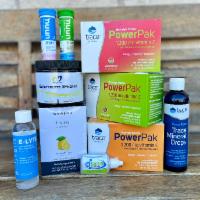 Summers in Texas seem more like oven temperatures than weather. The hottest day ever recorded in Austin, Texas was 112 degrees F on September 5, 2000 and again on August 28, 2011.(1) Outdoor activity can be lethal this time of year. Heat stroke happens when the body is unable to cool down and body temperature reaches 106 degrees F or higher within 10-15 minutes. When your temperature increases this rapidly, it out-competes sweating, your body’s main cooling system. The Center of Disease Control reports that each year an average of 658 people die of completely preventable heat-related deaths.(2)
Summers in Texas seem more like oven temperatures than weather. The hottest day ever recorded in Austin, Texas was 112 degrees F on September 5, 2000 and again on August 28, 2011.(1) Outdoor activity can be lethal this time of year. Heat stroke happens when the body is unable to cool down and body temperature reaches 106 degrees F or higher within 10-15 minutes. When your temperature increases this rapidly, it out-competes sweating, your body’s main cooling system. The Center of Disease Control reports that each year an average of 658 people die of completely preventable heat-related deaths.(2)
Preventing heat stroke is about setting your body up for success.
Dehydration is a major factor in becoming overheated. Your circulating blood is the main way you regulate body temperature. With dehydration, your blood volume decreases, making cooling your body more difficult. How do we become dehydrated? Mainly by not drinking enough water.
People are used to hearing that they need to drink 8 glasses of water per day. However, this is only appropriate for a 130 pound person. To better suit more body types, we usually recommend to drink half your body weight in ounces. This means a 180 pound person should drink 90 ounces, or 2.7 liters (or quarts) or 11.25 glasses.
When we sweat, we often drain electrolytes in the body. Adding 1 teaspoon of pink salt per liter of water is a cheap way to support electrolytes. However, if you are severely dehydrated, doing out-door exercise or sports, or just need better support, balanced electrolyte formulas exist. My favorite is the Elete electrolyte drops. The formulation for these drops is very concentrated, usually you just need one capful per liter to sustain the electrolyte balance. Other great formulas are Nuun tablets and Ultima drink mix. If you don’t like mixing electrolytes in your water, we recommend Trace Mineral Electrolyte Stamina – 4-6 tablets per day.
Electrolytes actually help you crave water. Some people just don’t have a strong urge to drink plain water. Adding electrolytes changes the flavor profile of water. You can also add a little bit of lemon or berry juice to improve the palatability of water and help increase your intake.
Drinking beverages that dehydrate you is also a big concern.
Dehydrating liquids include:
- Soda pops
- Sparkling mineral waters (or any carbonated beverages!)
- Coffee
- Tea
- Sugary juices
- Alcohol
If you consume these, add another 24-32 ounces to your calculation of total water consumption. A really common heat stroke set up is not drinking water, having coffee in the morning, and working outside (perhaps even drinking alcohol the night before). Want a cold beer after mowing the lawn? Sorry, you need cold water. You have to be very mindful of things that hydrate and dehydrate you in this hot weather.
There are a few lesser known factors that can lead to dehydration and overheating.
- One is chronic diarrhea.
For people who have IBS-D, electrolyte imbalance is common and they may face an increased risk of overheating. If you have diarrhea, you need electrolyte support. During acute infectious diarrhea (usually from the flu or food poisoning) you need to seek urgent care to have IV fluid support, especially in this heat. - Anhidrosis, or the inability to sweat, is a less common condition that increases the risk of overheating.
You should sweat profusely. People who don’t sweat a lot (if at all) are at significant risk for heat stroke. Reversing anhidrosis can be done with L-Tyrosine supplementation. Epinephrine is needed to stimulate sweat secretion from the gland. With chronic epinephrine depletion, we don’t sweat. L-Tyrosine is the precursor to dopamine, which converts to norepinephrine and then to epinephrine. Supporting with L-Tyrosine stabilizes this imbalance. - Certain medications increase your risk for heat stroke.
These include antipsychotics, major tranquilizers, antihistamines, Parkinson’s medications and various sleep medications. Please consult with your pharmacist or doctor about these.(3) In addition, underlying medical conditions like heart and lung disease, diabetes, and metabolic syndrome create a larger risk of heat-related illness. Infants, children and people over the age of 60 also have a harder time with the heat.(4)
How do you know if you are succumbing to heat stroke? The major signs and symptoms are as follows:(5)
- Headache
- Nausea and brain fog
- Dizziness and confusion
- Weakness and fatigue
- Irritability
- Thirst
- Dry mouth
- Heavy sweating
- Elevated body temperature
- Passing out or losing consciousness
Heat stroke is preventable!
Be smart about your outdoor activities and understand your body’s need for water and electrolytes by being mindful about the beverages you consume and adjust your water intake accordingly. Know your body and health risks and by all means drink water!
Have more questions? The knowledgeable staff and practitioners at Peoples Rx are here for you, ready to offer you the support and supplements you need to make it through the blazing hot Texas summer.
 Amy Nelson, ND* received her Naturopathic Doctorate from the National College of Natural Medicine in Portland, OR where she studied nutrition, homeopathy, herbal and functional medicine. In addition, Dr. Nelson was the Associate at The IBS Treatment Center in Santa Monica where she treated irritable bowel syndrome and complex food allergies. Dr. Nelson utilizes her experience in natural medicine to address female and male hormonal imbalances, mental health, and digestive disorders. Amy is available for consultation at Peoples North.
Amy Nelson, ND* received her Naturopathic Doctorate from the National College of Natural Medicine in Portland, OR where she studied nutrition, homeopathy, herbal and functional medicine. In addition, Dr. Nelson was the Associate at The IBS Treatment Center in Santa Monica where she treated irritable bowel syndrome and complex food allergies. Dr. Nelson utilizes her experience in natural medicine to address female and male hormonal imbalances, mental health, and digestive disorders. Amy is available for consultation at Peoples North.
*Although licensed in other states, Naturopathic Doctors are not currently licensed in Texas.
If you have comments and/or questions about this blog, email us at blog@peoplesrx.com.
References:
- (https://www.currentresults.com/Yearly-Weather/USA/TX/Austin/extreme-annual-austin-high-temperature.php)
- https://www.cdc.gov/pictureofamerica/pdfs/picture_of_america_heat-related_illness.pdf
- https://www.cdc.gov/mmwr/preview/mmwrhtml/mm4921a3.htm
- https://www.ncbi.nlm.nih.gov/pmc/articles/PMC2900329/#:~:text=People%20with%20age%20over%2060,heatstroke%20%E2%80%94%20during%20prolonged%20heat%20events
- https://www.nhs.uk/conditions/heat-exhaustion-heatstroke/
